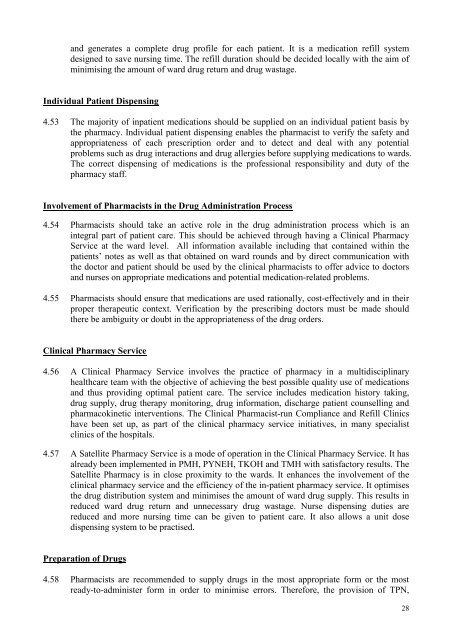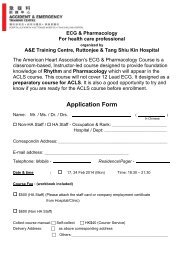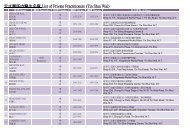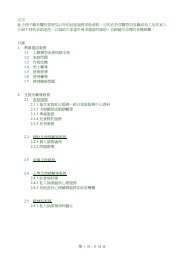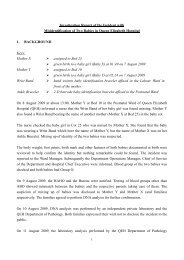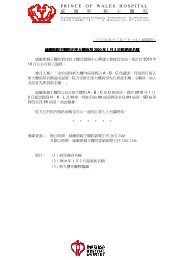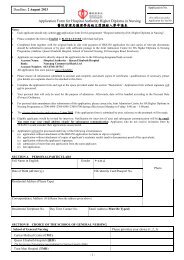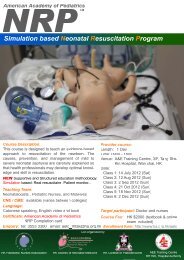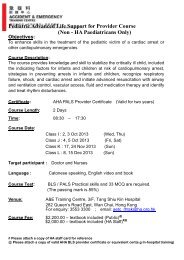2005 Edition Report on Drug Administration Procedure & Practices ...
2005 Edition Report on Drug Administration Procedure & Practices ...
2005 Edition Report on Drug Administration Procedure & Practices ...
You also want an ePaper? Increase the reach of your titles
YUMPU automatically turns print PDFs into web optimized ePapers that Google loves.
and generates a complete drug profile for each patient. It is a medicati<strong>on</strong> refill systemdesigned to save nursing time. The refill durati<strong>on</strong> should be decided locally with the aim ofminimising the amount of ward drug return and drug wastage.Individual Patient Dispensing4.53 The majority of inpatient medicati<strong>on</strong>s should be supplied <strong>on</strong> an individual patient basis bythe pharmacy. Individual patient dispensing enables the pharmacist to verify the safety andappropriateness of each prescripti<strong>on</strong> order and to detect and deal with any potentialproblems such as drug interacti<strong>on</strong>s and drug allergies before supplying medicati<strong>on</strong>s to wards.The correct dispensing of medicati<strong>on</strong>s is the professi<strong>on</strong>al resp<strong>on</strong>sibility and duty of thepharmacy staff.Involvement of Pharmacists in the <strong>Drug</strong> Administrati<strong>on</strong> Process4.54 Pharmacists should take an active role in the drug administrati<strong>on</strong> process which is anintegral part of patient care. This should be achieved through having a Clinical PharmacyService at the ward level. All informati<strong>on</strong> available including that c<strong>on</strong>tained within thepatients’ notes as well as that obtained <strong>on</strong> ward rounds and by direct communicati<strong>on</strong> withthe doctor and patient should be used by the clinical pharmacists to offer advice to doctorsand nurses <strong>on</strong> appropriate medicati<strong>on</strong>s and potential medicati<strong>on</strong>-related problems.4.55 Pharmacists should ensure that medicati<strong>on</strong>s are used rati<strong>on</strong>ally, cost-effectively and in theirproper therapeutic c<strong>on</strong>text. Verificati<strong>on</strong> by the prescribing doctors must be made shouldthere be ambiguity or doubt in the appropriateness of the drug orders.Clinical Pharmacy Service4.56 A Clinical Pharmacy Service involves the practice of pharmacy in a multidisciplinaryhealthcare team with the objective of achieving the best possible quality use of medicati<strong>on</strong>sand thus providing optimal patient care. The service includes medicati<strong>on</strong> history taking,drug supply, drug therapy m<strong>on</strong>itoring, drug informati<strong>on</strong>, discharge patient counselling andpharmacokinetic interventi<strong>on</strong>s. The Clinical Pharmacist-run Compliance and Refill Clinicshave been set up, as part of the clinical pharmacy service initiatives, in many specialistclinics of the hospitals.4.57 A Satellite Pharmacy Service is a mode of operati<strong>on</strong> in the Clinical Pharmacy Service. It hasalready been implemented in PMH, PYNEH, TKOH and TMH with satisfactory results. TheSatellite Pharmacy is in close proximity to the wards. It enhances the involvement of theclinical pharmacy service and the efficiency of the in-patient pharmacy service. It optimisesthe drug distributi<strong>on</strong> system and minimises the amount of ward drug supply. This results inreduced ward drug return and unnecessary drug wastage. Nurse dispensing duties arereduced and more nursing time can be given to patient care. It also allows a unit dosedispensing system to be practised.Preparati<strong>on</strong> of <strong>Drug</strong>s4.58 Pharmacists are recommended to supply drugs in the most appropriate form or the mostready-to-administer form in order to minimise errors. Therefore, the provisi<strong>on</strong> of TPN,28


